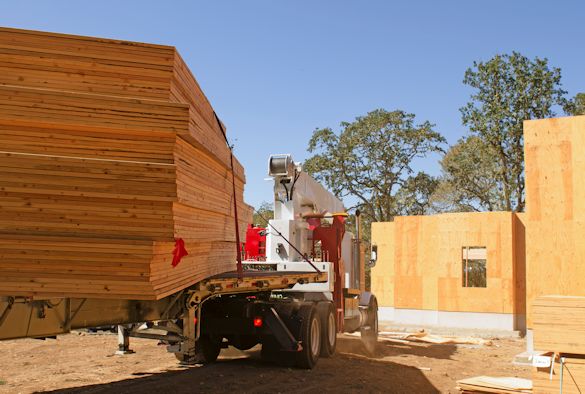
University researchers are leading a £4M EU project to minimise the use of toxic adhesives in the manufacturing of engineered wood products used by the construction industry.
Engineered wood products (EWPs) – also known as composite or manmade wood – refer to derivative wood products which are manufactured by binding or fixing the strands, particles, fibres, veneers or laminates of wood together with adhesives. They are used in a variety of applications, from home construction to commercial buildings and industrial products.
More than 5 million m3 engineered wood products were produced in the EU in 2013/14 and the market is growing, as they provide a ‘green’ alternative to steel and concrete in construction. However, a lot of adhesives are consumed in the current manufacturing of EWPs which cause emission of Volatile Organic Compounds (VOC) and make the recycling difficulty.
Researchers from the University’s School of Engineering are leading an industry and public sector collaboration to design, demonstrate and take forward new adhesive free engineered wood products using new technology.
Dr Zhongwei Guan, an international timber engineering and composite expert in the School of Engineering who is leading the project, said: “The aim of this project is to encourage and enable ten businesses to take up adhesive free engineered wood products which will have a huge positive environmental impact.
Here at Liverpool we will design, test and model adhesive free engineered wood products and connections using compressed wood fasteners, and further erect a demonstration of adhesive free timber building. The plan is to use timber to connect timber and to use timber to reinforce timber.
These will be 100% reusable and recyclable and in the long-term, will result in the production of 1 million m3 of adhesive free products, replace 6,000 tonnes of the toxic adhesives currently used in manufacturing and reduce the amount of engineered wood products being sent to landfill by 0.5 million tonnes.”
The project will support ten businesses in North West Europe, including seven from the UK, to adopt the new technology and produce a range of adhesive free EWPs.
The £4M Interreg project also includes the National University of Ireland, Galway, Université de Lorraine, Technische Universität Dresden, Luxembourg Institute of Science and Technology and the Office économique wallon du bois
Interreg is a European Territorial Cooperation programme with the ambition to make the North-West Europe area a key economic player and an attractive place to work and live, with high levels of innovation, sustainability and cohesion.
